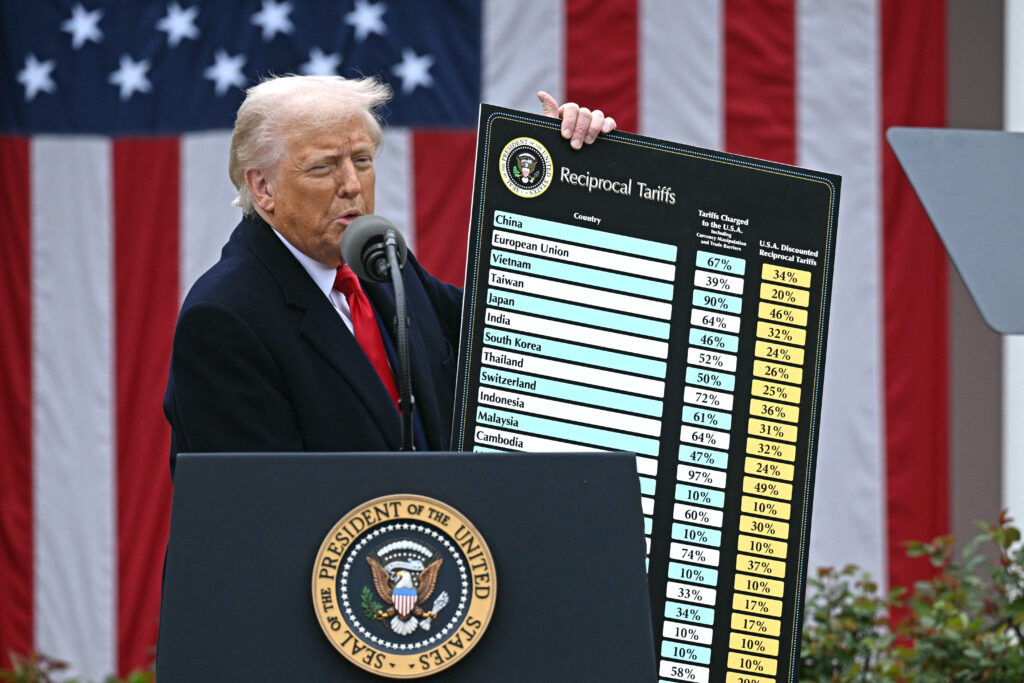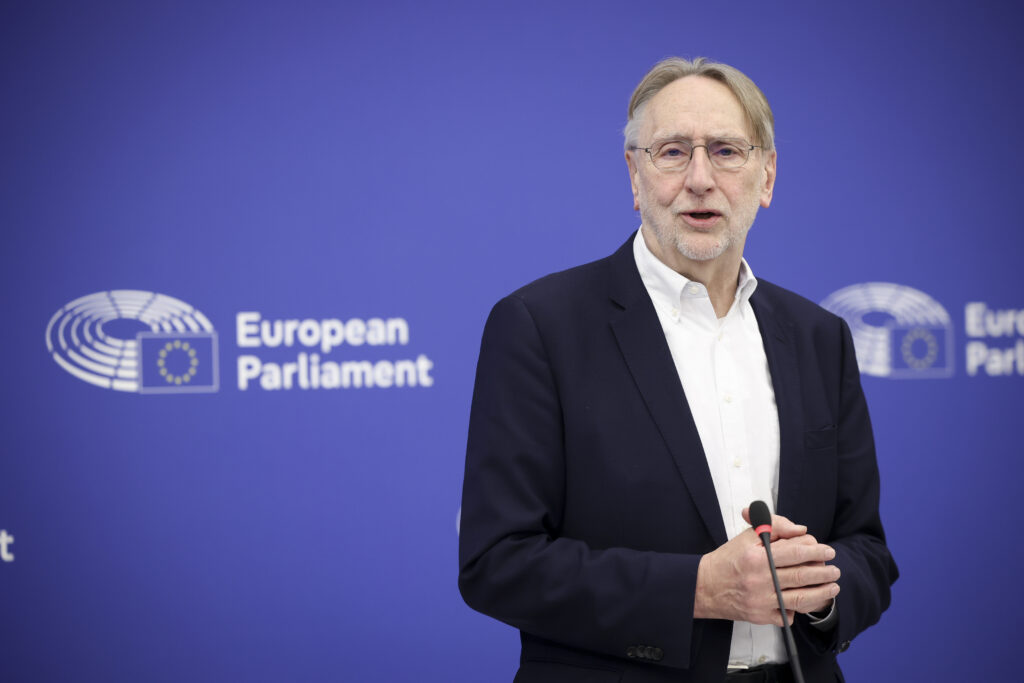From the correspondent in Strasbourg -The European Parliament sees with dismay the “new trade era” the whole world has entered after Donald Trump‘s historic decision to slap heavy tariffs on imports of products from all global partners of the United States. Europe will respond because it cannot do otherwise. Still, the hope between Strasbourg and Brussels is to find a political agreement and avoid an inflationary spiral that would benefit no one.
Speaking on the sidelines of the plenary session ending today (April 3) in Strasbourg, the European Parliament’s Committee on International Trade (INTA) president, Bernd Lange, firmly commented on the tariffs Washington decided late last night. What the New York-based tycoon called the “day of liberation” should instead be renamed the “day of inflation,” the German socialist noted, pointing out that the White House’s new “unfair practice” will “damage consumers and producers both in the EU and the US and even more so in the countries of the global South.” These are “unjustified, illegal, and disproportionate measures,” which will eventually trigger “further tariff escalation and a negative economic spiral for the US and the world,” Lange said.
Liberal Sandro Gozi speaks of a “dramatic geopolitical own goal” by Washington, an “attack on Europe, on free trade, on global economic stability” in the face of which “Europe will not take one step back.” The 5 Star Movement deplores Trump’s tariffs as “economic madness” and “a disaster for Made in Italy,” against which the European response “must be firm and should not be delayed.”
For the time being, no one on this side of the Atlantic is sure that they have fully understood the calculations of the US administration, which will respond with duties of 20 percent to an alleged European customs pressure of 39 percent. Trump has spoken of the “combined rate of all tariffs, non-monetary barriers, and other forms of cheating.” However, according to Lange, the president “thinks in an old-fashioned and mercantile way that trade is only about goods,” forgetting that there is “a surplus in services of about $100 billion between the US and the EU,” in addition to direct investments.

Reflecting on the reasons the White House gave to introduce the protectionist measures, the MEP said that “Trump is not really looking at tariffs” because the overall average of tariffs currently in place “is around 5 percent, well below the 20 percent” indicated by the US president, “and if we look at specific products, the average is 1.5 percent.” So, he reasons that the real motivation is “European legislation, from consumer protection to chemicals to digital services.” “It has not been possible to have genuinely constructive talks” with the US administration, the socialist laments, highlighting the substantial failure of the attempt by Trade Commissioner Maroš Šefčovič to defuse the crisis.
As for the European response, everyone has been careful to maintain cautious tones. The EU mainly aims for a negotiated resolution to bring Trump to the negotiating table. After that, it will respond since not retaliating “is not an option,” as the spokesman for the Populars for International Trade, Jörgen Warborn said. The response will be “proportionate, balanced, unified, and compatible with the rules of the World Trade Organization,” he reiterated, adding that the EU should take charge of a structural reform of the WTO to adapt it to “this new era.
“The next few weeks will be intense. On April 14, “there will be a European retaliation for illegal duties on steel and aluminum and other products,” the head of INTA announced, while a second tranche of countermeasures will come later because “we need to analyze the repercussions” of the tariffs introduced so far. In any case, “we want to limit our countermeasures only to limit the damage. We don’t want further retaliation.” The INTA committee will coordinate in the coming days with the DG Trade (the EU executive department in charge of trade), while on Monday (April 7), the trade ministers of the member states will meet. A Delegation from the European Parliament will travel to Washington to meet with White House officials and members of Congress. “Let’s see how to limit the damage,” Lange continued, stressing that trade is a competence of Congress rather than the president in the US and that an “intensive dialogue” will now be initiated with their US counterparts.

After all, he assures, “we have a highly developed toolkit and we will use it.” Among them, the “bazooka” is definitely the so-called anti-coercion tool, a series of measures which should act as a deterrent against potential economic pressure from third countries against the Union or possibly as responses to it. “We have discussed it,” Lange admits. However, everyone now describes it as an extreme ratio to only activate if other options fail. “Using it right away would lead to too rapid an escalation,” he warns, and in any case, it would not be lightning-fast because detailed investigations would have to be launched. In any case, the MEP points out, “our legislation is defensive,” whereas the laws relied on by Trump are “offensive.”
However, this does not mean that the EU remains defenseless in the face of aggression from an ally that has turned into a bully. “We will not back down,” Lange assures: “We will defend our sovereignty, and we will not change legislation that we have drafted democratically and in the interest of the citizens.” “Trump would love to split the EU,” but he will not succeed because “on trade, the Union is united,” he added. Both because it is the exclusive competence of Brussels and because “the economic interests of member states are intertwined” to the point that none of them would be interested in acting unilaterally.
As already pointed out by Ursula von der Leyen, who spoke the day before yesterday (April 1) at plenary proceedings, Trump’s abrupt decision must now become a catalyst for the 27 member states to strengthen the European single market, once and for all. “We are indeed dependent on the United States, but the EU is also important” to them, Warborn notes, and deepening the single market “will strengthen us and make us more resilient.” At the same time, the Old Continent also aims to deepen trade ties with third countries by entering into new free trade agreements such as those concluded in recent months with Mercosur and Mexico: the stick and the carrot approach. So far, the European carrot does not seem to have worked. It now remains to be seen whether the stick will be a convincing enough log or, instead, a twig.
Among the Italians, Nicola Zingaretti, head of the PD delegation, said, “The tariffs that Donald Trump has put in place are a dramatic blow to our businesses, economy, and workplace. Clearly, we must now negotiate and find a solution, but we must not negotiate asking for charity. We must negotiate as united Europeans and therefore stronger.” According to Zingaretti, “This is perhaps the biggest fault of Giorgia Meloni, who says she is a bridge-builder with the United States of America, but in reality, she risks becoming an accomplice of Trump’s policy against the interests of Made in Italy. The wrong attitude is also the result of divisions between the majority and the government. However, enough is enough: we must put the interest of Italian businesses and workers first.”
The 5 Star Movement delegation denounces that “the duties imposed by Trump are a disaster for Made in Italy and the many companies that export to the United States. They are also a detriment for American consumers who will suffer higher inflation and see the cost of so many food and non-food products rise.” According to the MEPs, “Against this economic madness of Donald Trump, the European response must be firm and must not be delayed. It is useful not only to look at new emerging markets, from South America to India and China but also to address the issue of tax avoidance practiced mainly by American multinationals.”
English version by the Translation Service of Withub






